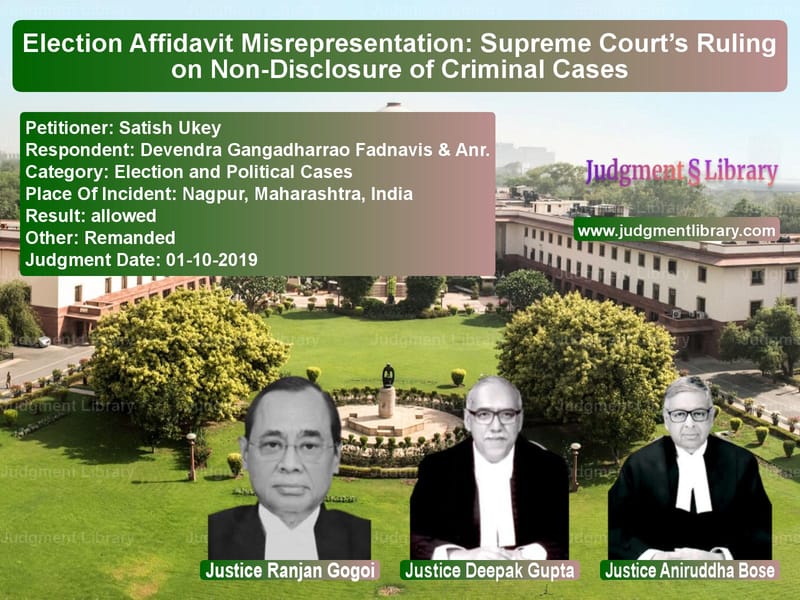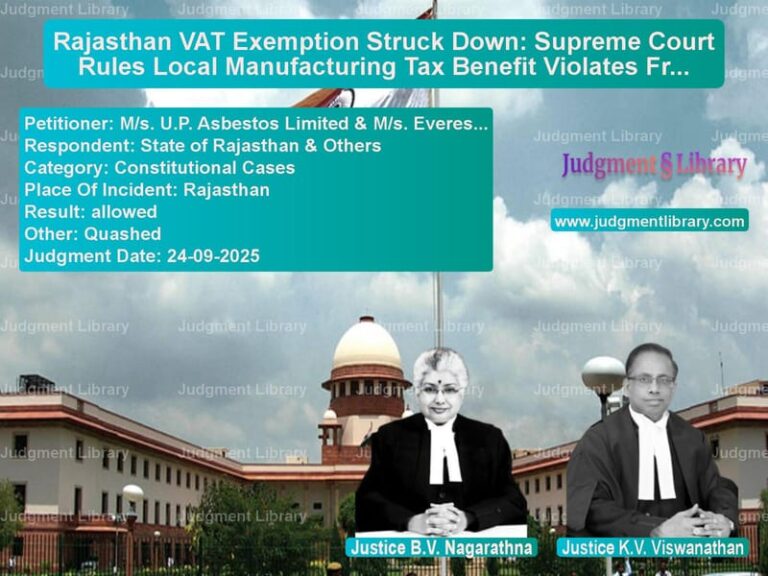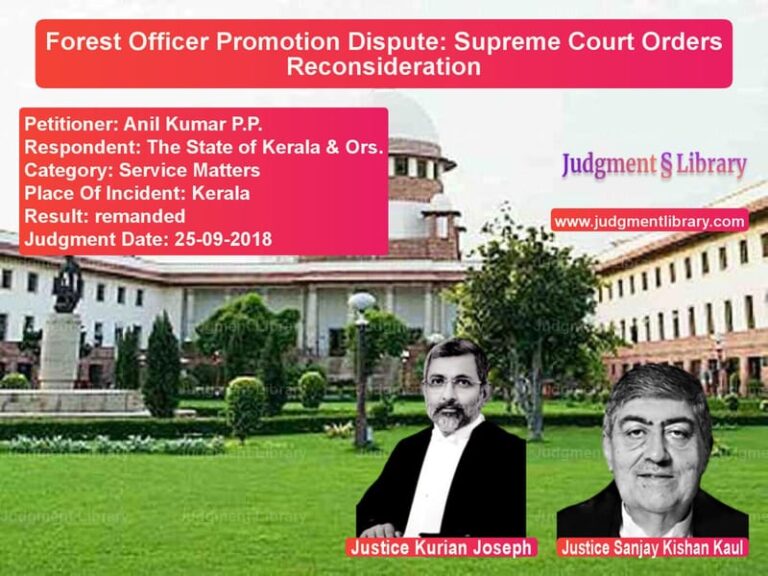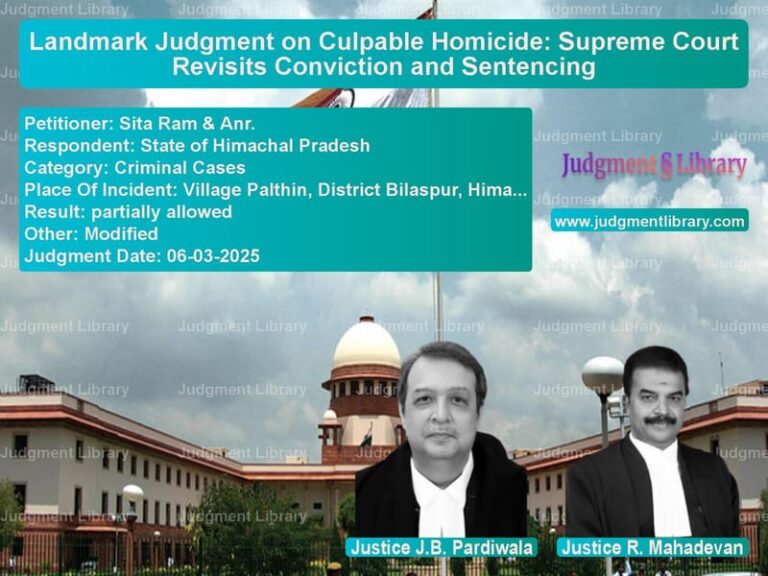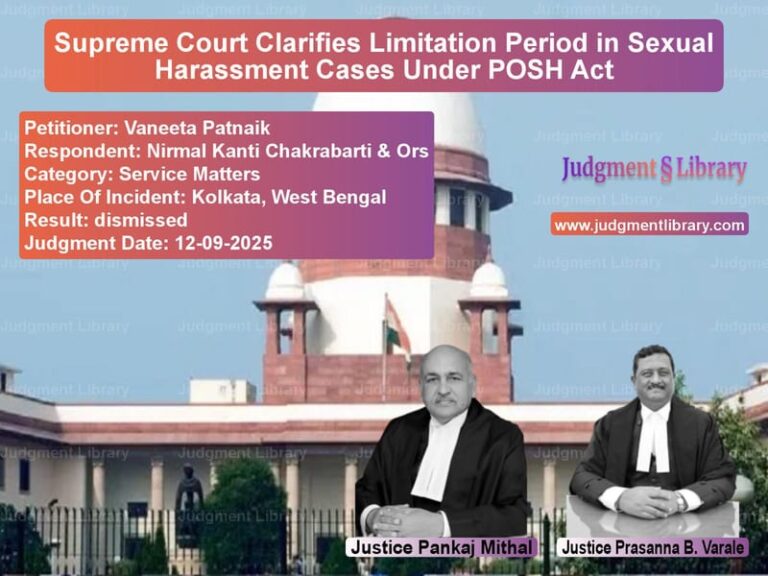Election Affidavit Misrepresentation: Supreme Court’s Ruling on Non-Disclosure of Criminal Cases
The case of Satish Ukey vs. Devendra Gangadharrao Fadnavis & Anr. involved an election-related dispute in which the appellant accused the respondent, a sitting Chief Minister of Maharashtra, of concealing criminal cases in his nomination affidavit. The Supreme Court was called upon to decide whether the omission of such details constituted an offense under Section 125-A of the Representation of the People Act, 1951.
Background of the Case
The appellant, Satish Ukey, a practicing advocate at the Bombay High Court, filed a complaint before the Judicial Magistrate First Class, Nagpur, alleging that the respondent, Devendra Gangadharrao Fadnavis, failed to disclose pending criminal cases in the affidavit submitted with his election nomination papers.
The criminal complaint alleged that in his affidavit (Form-26), filed under the Conduct of Election Rules, 1961, the respondent omitted details of two cases where cognizance had been taken:
- Summary Case No. 231 of 1996 – Filed under Section 500 IPC (defamation) before the Judicial Magistrate First Class, Nagpur.
- Regular Criminal Case No. 343 of 2003 – Filed under Sections 468, 471, 218, 467, 420, and 34 IPC before the Judicial Magistrate First Class, Nagpur.
The appellant claimed that this omission violated Section 125-A of the Representation of the People Act, 1951, which prescribes penalties for candidates failing to furnish complete information regarding pending criminal cases.
Petitioner’s Arguments
Satish Ukey, the petitioner, contended:
- The respondent was aware of the pending criminal cases but deliberately chose to omit them from his election affidavit.
- Under Section 33-A of the Representation of the People Act, 1951, a candidate is legally required to disclose all pending cases where cognizance has been taken by a court, not just those where charges have been framed.
- The omission constituted material suppression of information, which directly affected the transparency and fairness of the election process.
- The trial court’s dismissal of the complaint was erroneous, and the matter should have been considered based on legal precedent.
Respondents’ Arguments
Devendra Fadnavis and his legal counsel countered the allegations, arguing:
- The respondent had no intention to conceal any information; the cases mentioned by the petitioner were not significant for electoral disclosures.
- Under Section 33-A(1) of the Representation of the People Act, 1951, a candidate is required to disclose only cases in which charges have been framed, not merely those where cognizance has been taken.
- The omission did not amount to criminal misconduct, and the issue had already been dismissed in an election petition challenging his candidacy.
- The High Court correctly quashed the Sessions Judge’s order, ruling that the complaint lacked sufficient legal grounds for prosecution.
Supreme Court’s Observations
The Supreme Court closely examined the legal provisions and precedent cases. The Court made the following key observations:
“The requirement under Section 33-A of the Representation of the People Act, 1951, includes disclosure of all pending cases where charges have been framed. However, considering the evolution of electoral laws, cases where cognizance has been taken by a court should also be subject to scrutiny.”
Furthermore, the Court stated:
- The distinction between cases where charges have been framed and cases where cognizance has been taken is a crucial point that must be legally assessed.
- The Election Commission’s guidelines, which emphasize full disclosure, were issued to enhance voter transparency.
- Failure to disclose such cases may impact the credibility of the electoral process, requiring judicial intervention to assess the merits of the complaint.
Final Verdict
The Supreme Court ruled:
- The High Court’s order dismissing the complaint was set aside.
- The matter was remanded to the Judicial Magistrate First Class, Nagpur, for fresh consideration.
- The complaint should be examined based on the legal requirement of disclosing pending cases and whether it applied to cases where cognizance had been taken.
- The Election Commission and legislative authorities were urged to clarify disclosure requirements to avoid future ambiguities.
Legal and Policy Implications
The ruling has several significant implications for election law in India:
- Full disclosure is critical: Candidates must disclose all pending cases, including those where cognizance has been taken, to ensure voter awareness.
- Judicial oversight on electoral integrity: Courts play a crucial role in ensuring that candidates do not suppress material facts that may influence voter decisions.
- Clearer election guidelines needed: The judgment calls for amendments or clarifications in electoral laws to specify the scope of mandatory disclosures.
- Potential criminal liability: Failure to disclose pending cases can result in prosecution under Section 125-A of the Representation of the People Act, which prescribes penalties including imprisonment or fines.
Conclusion
The Supreme Court’s decision in this case underscores the importance of transparency and integrity in electoral processes. By remanding the case for fresh consideration, the Court ensured that candidates adhere to the highest standards of accountability. This judgment serves as a precedent for future cases concerning election affidavits and strengthens the legal framework governing political transparency.
Petitioner Name: Satish Ukey.Respondent Name: Devendra Gangadharrao Fadnavis & Anr..Judgment By: Justice Ranjan Gogoi, Justice Deepak Gupta, Justice Aniruddha Bose.Place Of Incident: Nagpur, Maharashtra, India.Judgment Date: 01-10-2019.
Don’t miss out on the full details! Download the complete judgment in PDF format below and gain valuable insights instantly!
Download Judgment: Satish Ukey vs Devendra Gangadharra Supreme Court of India Judgment Dated 01-10-2019.pdf
Direct Downlaod Judgment: Direct downlaod this Judgment
See all petitions in Public Interest Litigation
See all petitions in Fundamental Rights
See all petitions in Constitution Interpretation
See all petitions in Judgment by Ranjan Gogoi
See all petitions in Judgment by Deepak Gupta
See all petitions in Judgment by Aniruddha Bose
See all petitions in allowed
See all petitions in Remanded
See all petitions in supreme court of India judgments October 2019
See all petitions in 2019 judgments
See all posts in Election and Political Cases Category
See all allowed petitions in Election and Political Cases Category
See all Dismissed petitions in Election and Political Cases Category
See all partially allowed petitions in Election and Political Cases Category

